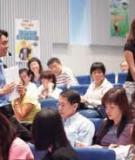
* Corresponding author
E-mail address:manhdung@ktpt.edu.vn (M. D. Tran)
© 2019 by the authors; licensee Growing Science, Canada
doi: 10.5267/j.uscm.2018.11.007
Uncertain Supply Chain Management 7 (2019) 483–494
Contents lists available at GrowingScience
Uncertain Supply Chain Management
homepage: www.GrowingScience.com/uscm
Knowledge sharing and individual performance: The case of Vietnam
Thi Phuong Linh Nguyena, Xuan Hau Doana, Manh Dung Trana*, Trung Thanh Lea and Quynh
Trang Nguyenb
aNational Economics University, Vietnam
bBanking Academy, Vietnam
C H R O N I C L E A B S T R A C T
Article history:
Received October 5, 2018
Accepted November 28 2018
Available online
November 28 2018
Knowledge sharing plays an important role in management of universities. Vietnam universities
are not highly regarded for their teaching quality and scientific research. It is therefore necessary
to promote knowledge sharing through two central processes: knowledge donation and collection
as well as individual performance of lecturers. Based on a sample size survey of 312 university
lecturers in Vietnam and the methods of analyzing exploration factor (EFA), factor analysis
(CFA), structural equation modeling (SEM) to examine the hypotheses of the survey, the study
determines that two individual factors; namely job satisfaction and other involvement
significantly influenced knowledge donation process. One individual factor also positively
influences knowledge collection process, knowledge self-efficacy, and lecturers’ willingness to
donate knowledge to improve individual performance. Finally, several suggestions for enhancing
the knowledge sharing and individual performance of lecturers for university managers are given.
Growin
g
Science, Canada ensee
by
the authors; lic9© 201
Keywords:
Knowledge sharing
Knowledge donation
Knowledge collection
Individual performance
1. Introduction
The university, as a center for knowledge creation and cultural preservation, not only develops human
resources but also maintains, manages and develops new knowledge that meets the needs of society.
Knowledge is considered to be an invaluable asset, a major source of national development and
knowledge management (Anantatmula, 2007) and therefore inevitably becomes an issue that needs to
be addressed in order to achieve the goals of organizations, particularly knowledge creation centers like
universities. Many management processes in universities have considered knowledge management,
such as management of training activities, management of science-technology activities, personnel
management, training and updating new knowledge for lecturers, creation of e-governance system,
knowledge sharing among lecturers, etc. The knowledge gained by lecturers and researchers is regularly
published in scholarly journals, books but knowledge is often scattered without the necessary
association and interrelationships. This is the task of the knowledge management team to establish
links, correlations and knowledge management systematically. However, grasping the tacit knowledge
of not only the teachers and researchers, but also of other employees and students, poses a challenge to
the universities.

484
Modern universities are complex organizations, with departments, faculties, laboratories, and research
laboratories. When a lecturer, administrator or librarian is retired, a gap is created. Those who are
replaced in their positions are often compared with their predecessors, and in many cases, the results
are inappropriate. Although, knowledge arises through long-term efforts of learning and research over
a long period of time, and therefore it cannot automatically be transferred to others quickly; but when
experience and knowledge are shared with others, and this sharing takes place in a context appropriate
to the rules, procedures, and technology that support it, we can say that shared knowledge have
appeared. Knowledge sharing is really important with universities in general and faculties in particular.
Mikulecky and Mikulecka (1999) argue that because of its nature, the university environment is
appropriate for the application of knowledge management principles and methods, as universities often
have a modern information infrastructure, sharing knowledge with others is the natural law of the
teacher. McAndrew et al. (2004) in their study confirm that lecturers wish to know what their colleagues
are thinking, what approaches they are currently using, opportunities to discuss them, and the ideas
with colleagues across the university. In addition, knowledge sharing is closely related to individual
performance and competitiveness (Du et al., 2007). Akram and Bokhari (2011) argue that effective
knowledge sharing is essential for determining the impact on individual performance. Research that
shows the relationships between knowledge sharing and individual performance is limited so this is a
space for researchers to learn about this relationship (Du et al., 2007). In the field of education, the
study of knowledge sharing and individual performance of university lecturers is also essential to
increase competitiveness in the knowledge economy in the context of globalization.
To fill this gap, this study develops a research model that links knowledge sharing enablers, processes
and individual performance. The study examines the influence of individual factors (enjoyment in
helping others, knowledge self-efficacy, job involvement), organizational factors (management support
and organizational rewards) and technology factors (information and communication technology) on
knowledge sharing processes and whether leads to individual performance. Based on a survey of 312
lecturers from 30 universities in Vietnam, this study applies the structural equation modeling (SEM) to
investigate the research model. Additionally, the current study contributes to knowledge sharing
research by further clarifying which factors are essential for knowledge sharing effectively. At a
minimum, the findings of this study provide a theoretical basis, and simultaneously can be used to
analyze relationships among knowledge sharing enablers, processes, and individual performance. From
a managerial perspective, the findings of this study can improve understanding and practice of
organizational management of knowledge sharing and individual performance. Specifically, this study
identifies several factors essential to successful knowledge sharing and discusses the implications of
these factors for developing organizational strategies that encourage and foster knowledge sharing.
2. Research Model and Hypotheses
The separation of knowledge sharing into two different processes, inherited by Van den Hooff and de
Ridder (2004) and Van den Hooff et al. (2004) from three previous studies. Weggeman (2000) studied
the difference between contributors and recipients in knowledge sharing process, Oldenkamp (2001)
discussed how to share knowledge between the people who wish to share the knowledge and the people
who wish to learn the knowledge. Ardichvili et al. (2003) viewed the knowledge sharing as the
provision of new knowledge and the demand for the new knowledge. Hooff and Weenen (2004) pointed
out that the two processes of knowledge donation and collection are different, and can be hoped to be
impacted by different factors. The factors that may affect these two processes are described in details
as follows:
Enjoyment in helping others
Enjoyment in helping others is rooted in the concept of altruism, in contrast to selfishness, that is, belief
in unprejudiced and disinterested acts (Lin, 2007). Osterloh and Frey (2000) argued that knowledge
sharing is motivated by intrinsic motivations. Wasko and Faraj (2000) also demonstrated that
individuals are motivated because they like to help others. Staff with altruism will have motivation and

T. P. L. Nguyen et al. / Uncertain Supply Chain Management 7 (2019)
485
interest in helping people (Davenport & Prusak, 1998). Altruism can promote an individual's
knowledge sharing with others without receiving any benefits (Al-Qadhi et al., 2015). The following
hypothesis thus is proposed:
H1. Enjoyment in helping others positively influences lecturer willingness to both (a) donate and (b)
collect knowledge.
Knowledge self-efficacy
Chiu et al. (2006) said that the desire to share knowledge is not enough to do knowledge sharing and
that a knowledge owner must be able to perceive it to be accomplished. When people think their
expertise can improve productivity and increase productivity, their attitude to knowledge sharing will
change and as a result, they will be more inclined to share knowledge with others (Shin et al., 2007).
Knowledge self-efficacy can encourage employees to share knowledge with others (Wasko & Faraj,
2005). Many researchers have shown that the more confident employees are with their own knowledge,
the more willing they are to share knowledge in order to fulfill specific responsibilities (Constant et al.,
1994). Hence, the following hypothesis is proposed:
H2. Knowledge self-efficacy positively influences lecturer willingness to both (a) donate and (b) collect
knowledge.
Job involvement
Job involvement is the extent to which a person feels the importance of work to himself (Lodahl &
Kejner, 1965). Job involvement helps employees feel confident in sharing their work-related
knowledge with colleagues (Teh & Sun, 2012). Hence, the following hypothesis is proposed:
H3. Job involvement influences lecturer willingness to both (a) donate and (b) collect knowledge.
Management support
Managerial support is seen as an important factor influencing knowledge sharing among employees
(Lee et al., 2006). Islam et al. (2014) emphasized the role of managerial support for knowledge sharing,
leadership, contributing to employee learning from personal experience, persuading employees transfer
knowledge to form new knowledge and influencing decision-making on the basis of valuable
knowledge shared among employees. Managerial support influences both the level and quality of
knowledge sharing by influencing employee engagement in knowledge management (Lee et al., 2006).
The following hypothesis is therefore formulated:
H4. Top management support positively influences lecturer willingness to both (a) donate and (b)
collect knowledge.
Rewards
Hansen and Avital (2005) argued that the main factors shaping an employee's view of knowledge
sharing are rewards. Chaudhry (2005) concluded that rewards are inspirational elements for knowledge
sharing. Individuals working in an organization are expected to be recognized and rewarded for sharing
their knowledge, experience, expertise with others. Rewards include recognition and reward as a tool
to facilitate knowledge sharing and help build a supportive culture (Liebowitz & Megbolugbe, 2003).
The following hypothesis is proposed:
H5. Rewards positively influence lecturer willingness to both (a) donate and (b) collect knowledge.
Information and communication technology (ICT)
Information technology is also seen as an indispensable tool to support the discovery of useful
knowledge (Ho et al., 2012). Collaborative tools such as the intranet system allow people to work
together and collaborate interactively. Individual knowledge, therefore, is transformed into

486
organizational knowledge through the support of information technology (Zhao & Luo, 2005).
According to Teece (1998), the ability of information and communication technologies is to reduce
barriers to knowledge sharing. It is important to identify relevant knowledge in different parts of an
organization to build a technical infrastructure to support and disseminate knowledge (Zakaria et al.,
2004). Hence, the following hypothesis is proposed:
H6. ICT support positively influences lecturer willingness to both (a) donate and (b) collect knowledge.
Individual performance is the behavior shown or something made by the staffs (Campbell, 1990).
According Motowildo et al. (1997), individual performance can be assessed according to the extent to
which it contributes to the efficiency of the organization. Onukwube et al. (2010) considered that it is
the behavior and result that the employees are involved in or carry on to contribute to the organization's
objectives. Individual performance relates to the degree to which an employee has the ability to perform
assigned tasks or how the work is completed contributes to the implementation of organizational goals
(Mawoli & Babandako, 2011). Von Krogh et al. (2000) pointed out that effective knowledge sharing
leads to better business processes, enhances organizational creativity, performance and value of
products and services. Du et al. (2007) also concluded that knowledge sharing have positive effects on
individual performance. The following hypothesis is proposed:
H7. Knowledge donation (a) and collection (b) positively influence to individual performance of
lecturer
Fig. 1. Research Model
3. Research Methodology
Data collection
We conducted in-depth interviews with 10 lecturers of Vietnam universities
in the city of Hanoi to
evaluate and adjust the questionnaire, and clarify the perceptions regarding the three processes of
knowledge sharing. The questions in the in-depth interview focused on the following issues: knowledge
sharing conditions, knowledge sharing content, factors affecting the process of knowledge donation,
factors affecting the process of knowledge collection and the relationship among knowledge donation,
collection and individual performance. The contents of the interview were recorded, stored and
encrypted in the computer. The recording was then tape-taped, synthesized and analyzed to make
conclusions to understand the similarities and differences between theoretical and practical models at
Vietnamese universities. From the results of in-depth interviews, we identified the formal model for
the study. A quantitative preliminary study with 25 lecturers was conducted to complete the
questionnaire, to avoid errors and mislead the meaning of the observations, and to verify the reliability
of the scales before conducting a formal investigation. Formal questionnaire survey was used to collect
data from lecturers of Vietnam universities in a convenient way. We investigated through
questionnaires sent directly and via the Internet (email, social networks and forums) thanks to google
docs tool. Time to collect data was from June to August, 2017. The results were 180 direct and 152
online questionnaires. After screening the invalid questionnaires due to lack of information and

T. P. L. Nguyen et al. / Uncertain Supply Chain Management 7 (2019)
487
unreliability, we collected 312 valid questionnaires to use for analysis. The demographic characteristics
of the sample are presented in Table 1. The gender of the respondents: 38.5% questionnaire was
answered by men; 61.5 % of questionnaire was answered by women. Regarding the age of the
respondents: 23.7 % respondents aged 20-30 years old; 51.3% respondents aged 31-40 years old; 16.0%
respondents aged 41-50 years old; 5.8% respondents aged 51-60 years old; 23.7% of subjects remaining
respondents aged over 60 years old. Regarding educational qualification of respondents: 4.5% of
respondents had bachelor's degree; 63.5% of respondents maintained master's degree; 30.1% of
respondents claimed to have doctor's degree; the remaining 1.9% of respondents had post-doctoral
degree. On the work experience of the respondents: 3.8% of respondents had work experience under 1
year; 21.8% of respondents from 1-5 years; 29.5% of respondents from 6-10 years; 22.4% of
respondents from 11-15 years and the remaining 22.4% of respondents had work experiences of over
15 years.
Table 1
Characteristics of the sample
Category Number of respondents Percentages (%)
Sex
Male 120 38.5
Female 192 61.5
Age
From 20 to 30 74 23.7
From 31 to 40 160 51.3
From 41 to 50 50 16.0
From 51 to 60 18 5.8
Over 60 74 23.7
Education qualification
Bachelor 14 4.5
Master 198 63.5
Doctor 94 30.1
Post-Doctoral 6 1.9
Working experience
Under 1 year 12 3.8
From 1 to 5 years 68 21.8
From 6 to 10 years 92 29.5
From 11 to 15 years 70 22.4
Over 15 years 70 22.4
Measures
Scales were drawn from literature review and in-depth interviews. Observations and scales were used
from foreign studies, which were translated from English into Vietnamese and then translated back into
Vietnamese. After completing the translation, we have consulted with some experts to ensure that the
variables and scales were accurately and clearly translated and did not significantly change the
meaning. All constructs were measured using multiple items. All items were measured using a five-
point Likert-type scale (ranging from 1= strongly disagree to 5 = strongly agree). A list of items for
each scale is presented in the appendix. The measurement approach for each theoretical construct in
the model is described briefly below. Enjoyment in helping others was measured using four items
derived from Wasko and Faraj (2000), which focused on belief in the act of carefree and unprofessional
interest in the interests of others. A five-item scale measuring knowledge self-efficacy was adapted
from a measure developed by Bock et al. (2005). It shows the action of the individual recognizes his or
her ability to provide detailed information about how the individual makes the decision to share the
knowledge. Job involvement was described by five items adapted form studies by Kanungo (1982).
Management support was measured using five items adapted from studies by Lu et al. (2006). These
measurements assess the vision of the organization is related to leadership involvement in the effective
use of knowledge. Rewards were measured using four items derived from Kankanhalli et al. (2005)
which were defined as financial and non-financial rewards provided to knowledge-sharing people.
Additionally, information and communication technology was measured based on three items taken
from Lee and Choi (2003), which referred to the degree of technological usability and capability
regarding knowledge sharing. Knowledge donating was measured using four items adapted from an














![Bài giảng Kỹ năng làm việc nhóm: Chương 1 - Lê Hoàng Mai [chuẩn nhất]](https://cdn.tailieu.vn/images/document/thumbnail/2025/20250612/minhquan0690/135x160/57471768211512.jpg)
![Đề cương ôn tập Kỹ năng làm việc nhóm [Năm]](https://cdn.tailieu.vn/images/document/thumbnail/2026/20260110/tantanno005@gmail.com/135x160/20951768203912.jpg)










